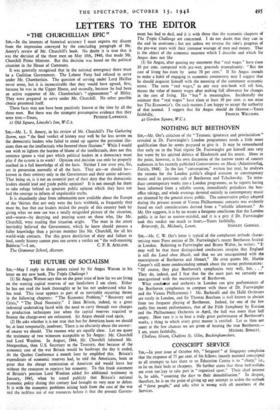THE FUTURE OF SOCIALISM
Sra,—May I reply to three points raised by Sir Angus Watson in his letter on my new book, The Triple Challenge ?
(1) Sir Angus Watson says that on the great issue of hetw far we are living on the wasting capital reserves of our forefathers I am silent. Either he has not read the book thoroughly or he has not understood what he has read. This issue appears as part of an inevitably recurring theme in the following chapters : " The Economic Problem," "Recovery and Crisis," " The Dual Necessity." I liken Britain, indeed, to a great industrial undertaking faced with the need to carry through vast changes in production techniques just when the capital reserves required to finance the change-over are exhausted. Sir Angus should read again.
(2) He asks whether it is not true that but for American loans we should be, at least temporarily, insolvent. There is no obscurity about the answer : of course we should. The reasons why are equally clear. Let me quote the testimony of two witnesses acceptable to Sir Angus : Mr. Churchill and Lord Woolton. In August, 1944, Mr. Churchill informed Mr. Morgenthau, then U.S. Secretary to the Treasury, that because of the economic cost of the war Britain would be bankrupt the day it ended, At the Quebec Conference a month later he amplified this. Britain's expenditure of economic reserves had, he told the Americans, been so great that the abrupt termination of American aid would leave her without the resources to reprieve her economy. To this frank statement of Britain's position Lord Woolton added his additional testimony in January, 1945, when he stated publicly that Britain's national economic policy during this century had brought us very near to defeat. It is with the economic problems arising both from the cost of the war and the reckless use of our resources before it that the present Govern- ment has had to deal, and it is with those that the economic chapters of The Triple Challenge are concerned. I do not doubt that they can in the end be overcome ; but not unless we reverse the rake's progress of the pre-war years with their immense wastage of men and money. That is the object of the economic measure which I describe and which Sir Angus does not like (3) Sir Angus, after quoting my statement that " real wages " have risen 10 per cent. compared with pre-war, proceeds triumphantly: " But the cost of living has risen by some 70 per cent." If Sir Angus intends to make a habit of engaging in economic controversy may I suggest that he should acquaint himself with the meaning of the commoner economic terms. The term " real wages," as any easy text-book will tell him, means the value of money wages after making full allowance for changes in the cost of living. His " but " is meaningless. Incidentally the estimate that " real wages " have risen at least 10 per cent. is not mine but The Economist's. On such matters I am happy to accept the authority of that journal. I suggest that Sir Angus should do likewise.—Yours


































 Previous page
Previous page